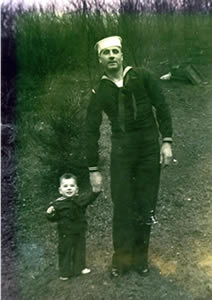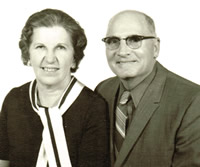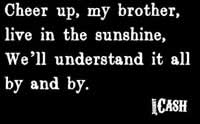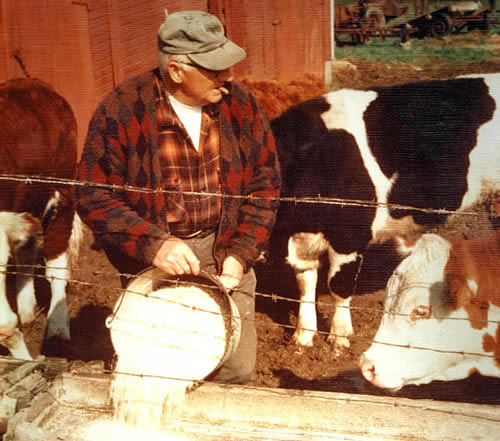
My dad, Richmond Edgar Dodd (Ed), a product of rural Georgia, was born in 1909 and died in 1999. A few months before Dad was born, his father died, leaving his mother, Minnie Lee, to raise Dad and his four older siblings. They lived a sharecropper's life -- I've seen a couple of the places they lived, and "sharecropper" may suggest a nicer living than the family had. My dad was part of the "Greatest Generation," serving in the Navy's Seabees, in the Philippines, during World War II.
Dad's schooling ended in third grade. His explanation was that he missed school a lot because he had to chop cotton, was held back a couple years, got mad and embarrassed because he was too big for the small third-grade desks, and just quit.
Although formal education was brief, he seemed well-educated, knowing much about history and politics. Not sure where he learned grammar, but he used proper grammar and often corrected my brother Lynn's and my usage. "You don't need the 'at'," a frequent admonishment. "It's just 'where is Mom?' NOT, 'where's Mom at'!"
Leaving the rural Georgia life in his twenties, he moved north to the Northern Panhandle of West Virginia and worked in the steel mills there (for 42 years), met and married my mother (who was from the area), many of the years also worked his 36-acre farm on a hill overlooking the Ohio River. His weekday schedule was usually: steel mill 7 a.m. to 3 p.m., dinner, up on the farm until evening. Why the farm, Dad? You had a full-time job. "I grew up poor in Georgia and lived through the depression. I didn't want to be hungry again."

While growing up, I don't remember Dad and me talking much, but in his later years we had time during a few trips I drove him to visit family in Georgia. I learned a lot I never knew. For one, the story about ending up in West Virginia wasn't as simple as we had initially been told. Yes, he did leave Georgia (with some friends) to come to the Wheeling, West Virginia area. But, those Georgia Crackers hated the North! After a few months, they packed up and went home. Apparently, a moonshine still was a key component of the going-home plan. Not long after starting to make the powerful stuff, they heard that the "Revenue Men" had gotten wind of their "project," and would be raiding soon. Dad and his cronies headed back north to the steel mills, never to return.
Although Dad was a regular church-goer, I really don't know whether he was a religious person. He didn't talk about such things ... but, I suspect he had deeper thoughts than were apparent to me. I remember one "religious-type" conversation, probably about the time I started college. "What do you think about those bible stories your mother teaches in Sunday School?" Dad asked me. "Like that Noah's Ark story? You think that's all true, Keith?" I was taken back a bit. Not by the question, but that he even thought about such things to ask me. "No, I have trouble believing that all that was like the story is told," I remember saying. "Neither do I," Dad said, kind of like appreciating that we agreed.
We didn't pursue the conversation. I've always regretted that we didn't. I think he would have appreciated us talking together about deeper things ... I know I would have. But neither of us took advantage of that opportunity. In retrospect, it would have been special and meaningful: Father and son, both wanting to be Believers, yet realizing that we couldn't swallow everything literally; but, wanting to work it out. I think we could have learned from each other ... and have grown closer. But, we didn't.
In his last years, Dad and Mom were together in a continuous care home. By then, Dad had lost most of his sight and was in a wheel chair. Periodically, I'd drive back (from Pennsylvania) to visit. I'd usually take Dad for a ride along the Ohio River and familiar spots ... often we'd drive up the hill to where his farm used to be. He couldn't see, but did seem to feel the area. He especially enjoyed riding while I played favorite country-western music on the car's CD player. Dolly Parton, the Statler Brothers ... and of course, his favorite, George Jones. I think the music strengthened a father/son bond.
I can still picture one of these drives together when the "Trio," Dolly Parton, Emmylou Harris, and Linda Ronstadt were on. We were driving
down the river road. They were singing the old gospel song, Farther Along. (Video of this song in Resources below.) The chorus repeats these lines: "Farther along,
 we'll know all about it; farther along we'll understand why. ... We'll understand it all by and by." We were savoring the words and music. After the last chorus, I asked, "Dad,
do you ever learn what it's all about? Does it really happen, farther along?" Dad was quiet awhile and just stared out the side window ... what he
saw, I don't know. Then, quietly he said, "Yes. Yes, you do."
we'll know all about it; farther along we'll understand why. ... We'll understand it all by and by." We were savoring the words and music. After the last chorus, I asked, "Dad,
do you ever learn what it's all about? Does it really happen, farther along?" Dad was quiet awhile and just stared out the side window ... what he
saw, I don't know. Then, quietly he said, "Yes. Yes, you do."
I wanted to ask the obvious question. But, I didn't. I was silent. And Dad didn't offer. I used to regret that I didn't ask. But, in a way, I'm glad I didn't. His answer would have been his answer. I might have been tempted to take his answer as mine. I see it now as a gift that he didn't tell me. I might not have been prodded to think about stuff like I do in these Reflections. (As I write these lines, I hear St. Paul's words to the Philippians: ... work out your own salvation with fear and trembling. [Philippians 2:12, English Standard.])
That's what I'm thinking about as I see Father's Day ahead on the calendar. A few things Dad and I said, many things not said. "Maybe, Dad, some day ... farther along ... we'll be able to talk again. Compare notes on 'what it's all about.'"
Happy Father's Day!

(Always with the stub of a cigar.)
Resources Related To this Reflection
 Farther Along sung by the "Trio", with lyrics shown. (Contrary to the video,
the gospel hymn was written in 1911 by Rev. W. A. Fletcher, not Dolly Parton.)
Farther Along sung by the "Trio", with lyrics shown. (Contrary to the video,
the gospel hymn was written in 1911 by Rev. W. A. Fletcher, not Dolly Parton.)





